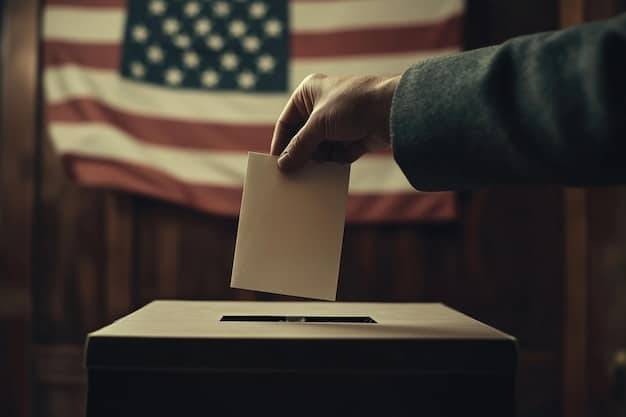Will the New Voting Rights Act Face Legal Challenges?

The New Voting Rights Act may face legal challenges based on constitutional grounds such as federalism and the First Amendment, potentially leading to outcomes like injunctions, Supreme Court reviews, and altered election administration.
Understanding the potential legal battles and outcomes surrounding the New Voting Rights Act Face Legal Challenges and What are the Potential Outcomes? is crucial for anyone interested in US politics and the future of elections. This article delves into the possible challenges and their implications.
Understanding the New Voting Rights Act
The introduction of a New Voting Rights Act is typically designed to address perceived inequalities or deficiencies in existing voting laws. These acts often aim to expand access to voting, protect minority voting rights, or modernize election administration processes.
Key Provisions of the Act
The New Voting Rights Act might include provisions such as automatic voter registration, expanded early voting options, and measures to prevent voter suppression. Understanding these provisions is essential to grasping the potential legal challenges.
Key aspects of the Voting Rights Act often involve protections against discriminatory voting practices, ensuring fair access to the ballot for all citizens, and establishing federal oversight to prevent voter suppression.

The act can also seek to modernize election infrastructure, enhance cybersecurity, and establish clear, enforceable standards for voter identification, further improving election integrity and accessibility.
- Automatic Voter Registration
- Expanded Early Voting
- Prevention of Voter Suppression
The Voting Rights Act must walk the fine line of defending democracy by ensuring everyone gets a chance to vote, but also respecting the current laws to ensure the process is legal and democratic.
Potential Legal Challenges Based on Federalism
One of the primary legal challenges that could arise against the New Voting Rights Act is based on principles of federalism. Federalism, as enshrined in the U.S. Constitution, divides powers between the federal government and state governments.
Tenth Amendment Concerns
Opponents of the Act might argue that it infringes upon the states’ rights to administer their own elections, as guaranteed by the Tenth Amendment. This argument often centers on the idea that the federal government is overstepping its constitutional boundaries.
The heart of this challenge lies in the states’ rights argument that views election management as a state prerogative. The New Voting Rights Act could potentially alter these established state powers.
Navigating federalism can be tricky, as both state and the federal government can create the proper laws. To make sure federalism works effectively, collaboration is key. Federal guidelines must align with states’ administrative practices.
- States’ Rights to Administer Elections
- Federal Overreach Arguments
- Constitutional Boundaries
The question now becomes, does the Act overstep its required legal boundaries, or is it simply trying to uphold democracy?
First Amendment Challenges
The First Amendment, which protects freedom of speech and association, can also form the basis for legal challenges. These challenges may arise if the Act is perceived to restrict political speech or unduly regulate campaign activities.
Restrictions on Political Speech
Some critics might contend that certain provisions of the Act impose undue burdens on political speech. This could include regulations affecting campaign finance or restrictions on advocacy efforts related to elections.
The regulation of campaign finance is a constant back-and-forth between protecting speech and preventing corruption. First Amendment challenges often scrutinize whether specific regulations overstep constitutional boundaries.

The ongoing conversation about free speech and fair elections is always evolving. Legislative actions must carefully protect these basic rights while also creating processes and regulations.
- Undue Burdens on Political Speech
- Regulations Affecting Campaign Finance
- Restrictions on Advocacy
Balancing free speech and election integrity is an ongoing legal and political challenge. Courts play a vital role in resolving these conflicts, ensuring laws meet constitutional standards.
Judicial Review and Interpretation
The role of the judiciary, especially the Supreme Court, will be crucial in determining the fate of the New Voting Rights Act. Judicial review is the process by which courts examine the constitutionality of laws.
Supreme Court’s Role
The Supreme Court’s interpretation of the Constitution will guide the resolution of legal challenges. The Court’s decisions can either uphold the Act, strike down specific provisions, or set new parameters for voting rights law.
Past Supreme Court rulings on voting rights have significantly shaped the legal landscape. Understanding this history provides an essential backdrop to how the Court might approach new challenges.
The judiciary’s role is to impartially interpret and apply constitutional principles. Therefore, the Supreme Court often hears cases involving challenges to legislation affecting fundamental rights.
Key cases impacting the VRA have shaped how the judiciary makes fair decisions. Cases related to redistricting, voter ID laws, and preclearance requirements provide insight into the judicial approach.
- Supreme Court’s Interpretation
- Historical Voting Rights Rulings
- Impact on Voting Rights Law
The Supreme Court’s stance on the New Voting Rights Act will significantly impact the future of voting rights in the United States. All legal eyes are on them as they deliberate.
Potential Outcomes of Legal Challenges
The legal challenges to the New Voting Rights Act can lead to a variety of outcomes. These outcomes can range from upholding the Act in its entirety to striking down specific provisions or the entire law.
Injunctions and Court Orders
Courts may issue injunctions or other orders that temporarily halt portions of the Act from taking effect. This would give the time to consider the legal challenges. It would also give them time to ensure that the process is fair to everyone.
Legislative Amendments
If certain provisions of the Act are struck down or deemed unconstitutional, the legislative branch could amend the law to address the legal issues. This is a common response to judicial decisions.
If a court identifies specific flaws in the New Voting Rights Act, policymakers often respond by revisiting the law and refining its language to address constitutional concerns while preserving its core objectives.
As legal challenges arise, legislatures might consider the feedback and consider alternate policy options that both address concerns over voting rights and meet the standards of the federal government.
- Upholding or Striking Down Provisions
- Injunctions Halting Implementation
- Legislative Amendments
The legal challenges to the law allow legislatures and policymakers to take a step back and consider viable solutions that serve our democratic needs.
Impact on Election Administration
Regardless of the legal outcomes, the New Voting Rights Act and the ensuing legal challenges are likely to have a significant impact on election administration. States and local election officials must navigate new rules and legal interpretations.
Changes to Voter Registration
If the Act introduces or modifies voter registration processes, election officials will need to update their systems and procedures. Education and public outreach campaigns may also be necessary to inform voters about the changes.
The New Voting Rights Act may bring changes to voter eligibility requirements, requiring election officials to update their registration databases, inform the public of eligibility rules, and deal with potential confusion among voters.
Legislative actions must consider compliance costs and logistical considerations to allow election administrators to update infrastructure and create the processes voters need.
- Updating Systems and Procedures
- Education and Public Outreach
- Increased Compliance Costs
The collaboration of election officials and policymakers can pave the way for efficient and effective administration and improve voter participation.
| Key Topic | Brief Description |
|---|---|
| 🗳️ Federalism Issue | Act’s potential infringement on states’ rights to manage elections as per the Tenth Amendment. |
| 📢 First Amendment | Concerns about restrictions on political speech and campaign activities violating free speech rights. |
| ⚖️ Judicial Review | Supreme Court will interpret constitutionality, possibly altering or upholding the Act. |
| 🏛️ Election Changes | States adapt to voter registration and access changes. |
Frequently Asked Questions
▼
The New Voting Rights Act usually seeks to address historical and contemporary barriers to voting, ensuring fair and equal access to the ballot for all eligible citizens, especially minorities and marginalized groups.
▼
Legal challenges often revolve around federalism, with states claiming that the Act infringes upon their Tenth Amendment rights. Some argue that federal regulations overstep constitutional boundaries and usurp state power.
▼
Challenges under the First Amendment often question whether the Act unduly restricts political speech or campaign activities. Regulations on campaign finance and advocacy efforts might be seen as infringing on free speech.
▼
The Supreme Court serves as the ultimate arbiter, interpreting the constitutionality of the Act and settling legal disputes. The Supreme Court ultimately decides with the Act is legal and valid.
▼
Legal challenges can result in the Act being upheld, partly struck down, or entirely invalidated. Courts may issue orders that temporarily halt sections of the Act from coming into effect or mandate legislative amendments.
Conclusion
The New Voting Rights Act faces a complex legal landscape, with potential challenges rooted in federalism and the First Amendment. The outcomes of these legal battles will significantly shape election administration, potentially leading to legislative changes or judicial interpretations that redefine voting rights in the US.